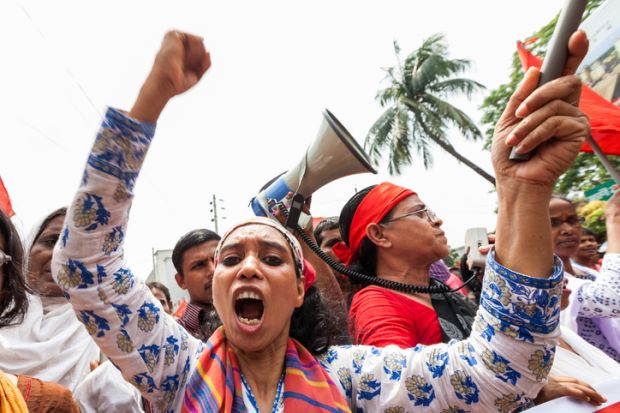Student protests in Bangladesh are evolving from demonstrations against a single issue to an all-out revolt against the country’s autocratic government led by a frustrated – and sizeable – youth population, according to experts.
The protests that broke out on university campuses against government job quotas in July swiftly escalated, with more than 200 people killed in the ensuing violence.
The government was quick to repress protesters, including implementing an internet blackout, deploying the army and, according to rights groups, using tear gas and lethal firearms on unarmed protesters. Since the protests began, thousands have reportedly been detained.
“The mass arrest and arbitrary detention of student protesters is a witch hunt by the authorities to silence anyone who dares to challenge the government and is a tool to further perpetuate a climate of fear,” said Smriti Singh, regional director at Amnesty International.
Some believe that the government, which has become increasingly autocratic under prime minister Sheikh Hasina, is fearful of student groups, which have been at the forefront of multiple political movements in the country’s history.
“Such a level of violent crackdown on students is unprecedented,” said Hossain Zillur Rahman, a Bangladeshi education and economic expert. “What is also unprecedented is the mood and the resolve of the students to really act in the way that they have.
“It started with student protest but essentially now it’s about the political future,” he said, adding that there is a general feeling of discontent among students due to high unemployment and widespread corruption.
Campus resource collection: Higher education’s role in upholding democracy
While the government has agreed to scrap the quotas, demonstrations continue, with students now calling for the government to be held accountable for the deadly crackdown.
“This will live long into the memory of this young generation and I think this protest will turn into a protest that will want to hold Hasina accountable,” agreed Mubashar Hasan, a Bangladeshi human rights activist and postdoctoral fellow at the University of Oslo.
In addition, the Bangladeshi public is broadly behind the students, having been “utterly shocked and horrified” by the government’s violent response to the protests, according to Naomi Hossain, professor of development studies at SOAS University of London.
“It signifies a total loss of legitimacy, without which the government will struggle to survive,” she said.
According to Al Jazeera, student groups have also called for the resignation of the vice-chancellors of three universities and for the Bangladesh Chhatra League, the notoriously violent student wing of the ruling party, to be banned from student politics.
Universities and schools across Bangladesh remained closed, which Dr Rahman saw as a sign of the leadership’s nervousness.
“They are fearful that the moment they open them up, this will again come back with full force at the same time,” he said.
Academics predicted that this marks the beginning of a turbulent time in Bangladesh, with student-led protests expected to continue and the government clinging on to control.
“Given the extent of the anger and grievances harboured by so many students, which is unprecedented over Sheikh Hasina’s 15 straight years in power, and especially at a moment of worsening economic stress, I would expect more mass protests down the road,” said Michael Kugelman, director of the Wilson Center’s South Asia Institute.
“It is unlikely to bring down the regime, because the political settlement is well organised and strong,” said Professor Hossain. “But they have lost popular legitimacy. Keep in mind there are almost 30 million people aged 15 to 24 in Bangladesh. A government can only kill and terrorise so many of its people.”
Register to continue
Why register?
- Registration is free and only takes a moment
- Once registered, you can read 3 articles a month
- Sign up for our newsletter
Subscribe
Or subscribe for unlimited access to:
- Unlimited access to news, views, insights & reviews
- Digital editions
- Digital access to THE’s university and college rankings analysis
Already registered or a current subscriber? Login








